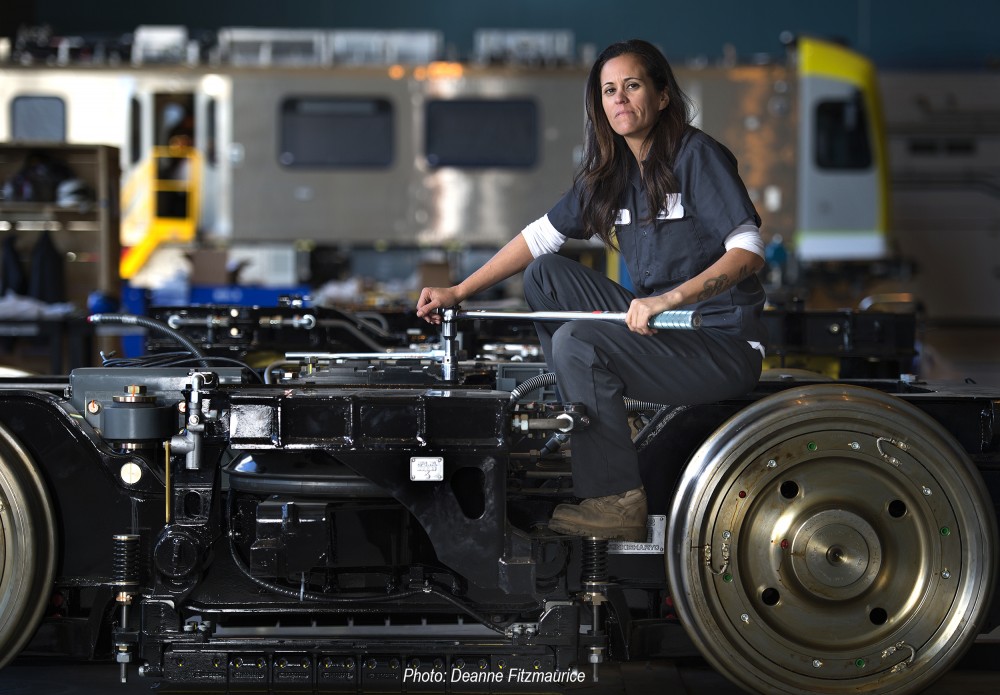$5.4 billion — that’s how much public transit agencies collectively spend on buses and trains each year.
U.S. public transportation authorities are using taxpayers’ dollars to employ Americans. Well, sort of — there’s a lot of room for improvement. Thanks to weak laws and procurement rules, taxpayer dollars all too often reward low-road companies that pay poor wages and routinely game our domestic content rules to manufacture just the minimum here in America.
That’s why transportation unions have long supported policies that raise domestic content standards for transit and rail purchases made with federal funds — the same kind of laws found in the recently passed Fixing America’s Surface Transportation (FAST) Act. In addition to being the first long-term, bipartisan surface transportation bill in a decade, the FAST Act raises Buy America standards for transit vehicles from a 60% minimum to a 70% minimum domestic content.
This is a great next step in our effort to beef up transportation manufacturing jobs, but we aren’t stopping now: the goal must be 100% domestic content for publicly funded transit and rail equipment orders. Unfortunately, changes to procurement laws alone aren’t enough to get us there. In fact, a new report by economist Robert Pollin and the Political Economy Research Institute (PERI) shows more can and needs to be done to ensure that investments in our nation’s transportation infrastructure help sustain domestic manufacturing and the millions of jobs the sector supports. The report, titled Strengthening U.S. Manufacturing Through Public Procurement Policies, focuses on railcar procurements, but its lessons can be applied to the broader Buy America program.
The report finds that:
- 60 is the new 40. Under law, 60 percent of component production and 100 percent of final assembly of railcar manufacturing are supposed to happen in the U.S. However, as the authors show, for a variety of reasons, these standards amount to an overall requirement of only 40 percent domestic production.
- Monitoring and enforcement standards are a weak link.Because few local transit agencies have adequate capacity to conduct audits in-house and public interest groups face major obstacles in obtaining relevant compliance information, the monitoring and enforcement of domestic content requirements leave much to be desired.
- Too many waivers are still granted.Available evidence suggests that a significant number of domestic content waivers are being granted to contractors bidding on transportation procurement projects covered under Buy America. The good news? Under the Obama Administration, the wavier process has improved significantly. But there’s more work that needs to be done. The Department of Transportation needs to keep systematic records on waiver applications and decisions and to establish consistently high thresholds for granting waivers.
As the authors of the study point out, we must pair stronger laws with straightforward, effective measures that encourage public transportation agencies to consider the impact of their purchases here at home. Some of the plans outlined in the report — including changes to Request for Proposal (RFP) procedures — are the same kind of forward-thinking measures being pushed by the Jobs to Move America Coalition, of which TTD has been a member since 2013. They include incentivizing companies that bid on publicly-funded transportation equipment orders to describe the number and quality of jobs that would be created from a contract, and encouraging local transit authorities to select bids based on best value instead of just the lowest price. This new approach rewards employers that train their workers and make a genuine effort to hire people from disadvantaged populations including, for example, veterans and single mothers.
These kinds of smart procurement strategies act as a win-win for all parties involved: public transportation dollars help create good transportation manufacturing jobs here at home; transit agencies purchase high-quality, American-made components; and high-road manufacturers are rewarded for lifting labor standards and keeping buses and trains made in the USA.
Read the full report here.
